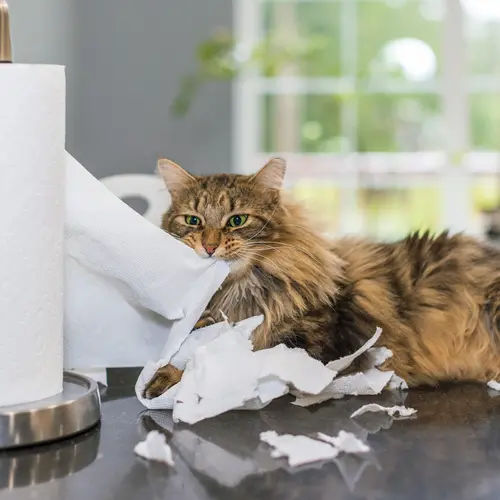Cats can get dandruff just like humans, and a small amount is normal. But if your cat has large amounts of dandruff, they may need to be looked at by their vet. The condition of a cat’s skin and hair can tell a vet a lot about the animal’s health.
What Is Cat Dandruff?
Cat dandruff, otherwise called “feline dandruff,” is a condition that causes your cat’s skin to flake. It’s normally seen as gray or white flakes on the cat’s skin and hair. It can also cause dryness and itchiness.
Most cases of dandruff aren’t serious and the condition can get better with treatment. Sometimes, though, the presence of dandruff can indicate a serious health problem.
Why Does My Cat Have Dandruff?
Cats can develop dandruff for different reasons, including:
- Obesity. Cats with excessive fat can find it difficult to groom themselves. Regular grooming is needed to keep their coat clean.
- Buildup of the undercoat. Cats can have 2 types of coats — an outer coat with “guard” hairs and an undercoat with softer hair close to the skin. If the cat isn’t grooming themselves or you’re not brushing your cat regularly, dirt, dead skin cells, parasites, and loose hairs can start to build up.
- Skin allergies
- Skin infections. These can be bacterial or fungal.
- External parasites. External parasites include fleas, lice, ticks, and parasitic mites like demodex canis. Another type of external parasite called Cheyletiella mites can cause a highly contagious form of dandruff called “walking dandruff.” Humans can get infected by this mite species, too.
- Malnutrition
- Underlying health conditions. Sometimes your cat can have other health conditions that make it difficult for them to self-groom, like kidney disease, arthritis, pancreatitis, or diabetes.
- Hormonal conditions. This includes hyperthyroidism.
- Autoimmune skin conditions. This includes the rare illness, pemphigus.
- Cancer. Such as cutaneous lymphoma.
How Do You Treat Dandruff in Cats?
It's best to contact your vet to identify the cause of your cat's dandruff and get the best possible treatment. The treatment will depend on the source of dandruff. For instance, if your cat has parasites, your vet may recommend flea control medication. If it’s a case of an infection, your vet may have your cat take antibiotics or antifungal medication.
Your cat may also be given skin supplements and creams or lotions to treat dry and flaky skin. Your vet may review your pet’s diet and suggest changes if needed. You may also be asked to brush your cat daily to dislodge existing dandruff. You may need to brush more frequently if your cat has long hair or a lot of hair.
If you’re a pet owner who is allergic to your cat, you can find it challenging to deal with cat dander or the skin cells that your cat sheds. Your vet will provide treatment for your cat, which may, in turn, help to ease your allergy symptoms. If you need medical treatment to provide relief from allergies, you will need to visit your own doctor.
Regular brushing can be beneficial for your cat because it helps to distribute the natural oils along the length of the hair and keeps the hair free from dirt, loose hairs, parasites, and dead skin cells. Speak to your vet before you start any new grooming practices for your cat if they have dandruff.
Avoid trying to treat your cat yourself without talking to your vet.
When to Contact a Vet
Contact your vet for treatment if you notice dandruff in your cat. Also, contact your vet if you see any of the following:
- Itchiness
- Changes in behavior
- Parasites
- Skin lesions, which are areas of the skin that have abnormal growths or a different appearance compared to the rest of the skin around them like rashes
- Other animals or human members of the family develop skin lesions
- Your cat starts to limp or has stiffness in the joints
- Your cat self-grooms less often
- Vomiting
- Changes in appetite
- Changes in how your cat uses the litter box
- Changes in how much water your cat drinks
- Fur loss, also known as alopecia
- A dirty or greasy coat
Conclusion
Cats like to keep themselves clean, so small amounts of dandruff aren’t usually a cause for concern. If your cat is otherwise healthy, your vet may suggest home remedies to manage your cat’s dandruff. Most cases of dandruff are minor and usually improve with treatment.
